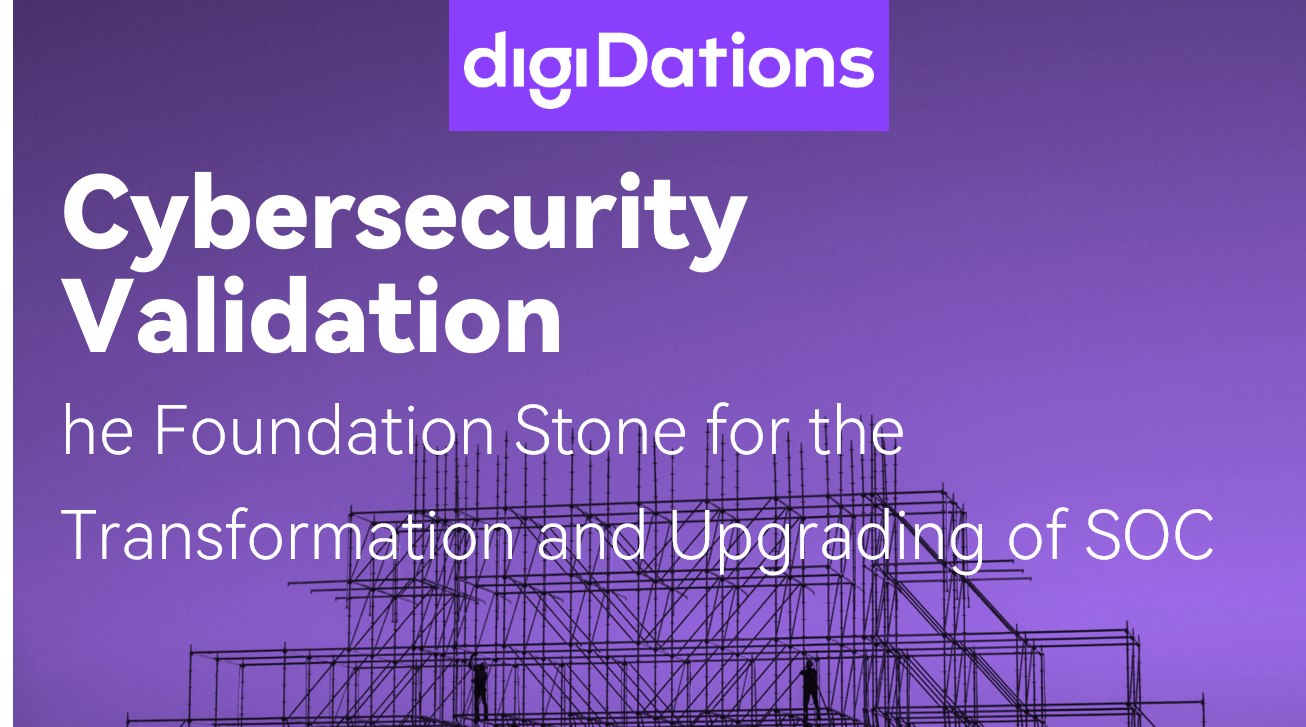Amid the wave of digital transformation, the evolution of Security Operations Centers (SOCs) has become a core mission for enterprise cybersecurity, playing a pivotal role in overall security operations. Cybersecurity validation, as a critical component of SOC modernization, is redefining how defensive effectiveness is measured—shifting security operations from reactive response to proactive defense.
01 Cybersecurity Validation: The Shift from Reactive to Proactive
Traditional SOC models rely on alert-driven reactive mechanisms, which struggle against increasingly sophisticated cyber threats. Cybersecurity validation enables SOC teams to proactively identify weaknesses in their defenses through continuous evaluation of security control effectiveness. The process goes beyond assessing individual security tools, focusing instead on the collaborative resilience of the entire security architecture.
In practice, validation simulates real-world attack scenarios to rigorously test detection, response, and recovery capabilities. This approach provides security teams with empirical data on their defenses’ actual performance—moving beyond vendor claims or isolated alerts. For example, one financial institution improved its threat detection accuracy by 40% and reduced false positives by 60% after implementing validation.
02 The Strategic Value of Validation in SOC Modernization
Cybersecurity validation introduces a quantifiable framework for measuring security efficacy. By establishing benchmark metrics, SOCs can objectively evaluate ROI on security investments and optimize resource allocation. This data-driven methodology elevates decision-making from guesswork to science.
Validation also uncovers inefficiencies in security workflows. Through iterative testing and refinement, SOCs streamline threat detection and response, slashing Mean Time to Detect (MTTD) and Mean Time to Respond (MTTR). A multinational corporation reduced its incident response time from 4 hours to just 30 minutes after adopting continuous validation.
03 Building a Continuously Validated Security Posture
Automation is foundational. An integrated cybersecurity validation platform unifies security tools, supports custom test scenarios, and delivers detailed assessment reports. Automation ensures consistency, repeatability, and scalability.
Closing the feedback loop is critical. SOCs must translate validation insights into actionable improvements. One cloud provider, for instance, identifies and remediates ~200 misconfigurations quarterly by institutionalizing validation-driven remediation cycles.
04 The Future of Cybersecurity Validation
With advancements in AI and machine learning, validation is becoming intelligent. Predictive analytics and real-time defensive assessments will further enhance SOCs’ proactive capabilities.
Validation will also expand beyond traditional perimeters into cloud-native and IoT environments, demanding innovative tools and methodologies tailored to modern infrastructure.
Digidations: Shaping the Future, Redefining SOC Value
The Atlas Cybersecurity Validation Platform is committed to enhancing organizations‘ overall capabilities throughout the entire lifecycle of security operations. The platform’s functional system is divided into four core stages, corresponding to the key links in the establishment and operation process of SOC.
In the product deployment stage, the platform can assist users in evaluating the capability characteristics of various security products, providing decision-making support for the initial construction of SOC. After determining the procurement plan, the platform will help users validate the deployment of the security defense system, continuously ensuring that all security products meet the expected architectural design and working requirements, including key elements such as the opening of functions, the correctness of configurations, log transmission, and time synchronization.
In terms of correlation analysis capabilities, the platform will comprehensively evaluate the deployed heterogeneous security products, identifying the advantages and disadvantages of each product. For the identified weaknesses, it will supplement the necessary auditing means to provide the most original logs for SOC. The platform can generate Sigma rules through AI technology and import them into the SOC platform, and achieve correlation analysis according to the contextual behavior of attacks, thus compensating for the impact on threat detection capabilities when a single security product does not generate an alarm in a single dimension. At the same time, the platform integrates rich threat organization attack data, can provide a full attack chain analysis, helps SOC improve its threat organization hunting capabilities, and accumulates security knowledge for the operation team.
Finally, the platform focuses on improving operational efficiency. By validating indicators such as work order processing processes, incident response timeliness, and event traceability, it uses AI analysis to identify efficiency bottlenecks and provides practical optimization suggestions.
The Atlas Cybersecurity Validation Platform deeply integrates AI technology, significantly improving the product’s ease of use and efficiency:
- Attack Understanding: AI can automatically analyze complex attack payloads and transform professional technical details into understandable threat descriptions.
- Log Parsing: AI intelligently processes the unstructured logs of various security products, extracts key information, and conducts correlation analysis.
- Validation Orchestration: The addition of AI enables the validation process to achieve true automation, and complex validation tasks can be completed without human intervention.
- Attack Derivation: With the help of AI capabilities, it can derive and mutate the attack actions in the current attack library, avoiding static detection and enhancing dynamic defense capabilities.
- Report Generation: Through AI, it automatically organizes the validation results and generates analysis reports with a clear structure and easy to understand.
- Mitigation Suggestions: AI intelligently outputs feasible mitigation measures based on the validation results, providing customers with precise improvement suggestions.
This combination of “validation scenarios from real attack events + AI empowerment” not only greatly enhances the technical leadership of the platform but more importantly, fundamentally solves the problems of poor ease of use and high usage thresholds existing in traditional cybersecurity validation tools. Through AI technology, we have made the complex work of cybersecurity validation simple and intuitive, enabling more enterprises to easily carry out security effectiveness evaluation and optimization improvement work.
Cybersecurity validation is reshaping the working mode and value positioning of SOC. By deeply integrating the validation mechanism into the security operation process, enterprises can build a more resilient and adaptable security defense system. In the context of digital transformation, cybersecurity validation is not only a technical means but also an important strategy to ensure business security. With the continuous development of technology, cybersecurity validation will play an even more crucial role in the transformation process of SOC, building a truly effective security line of defense for enterprises.
